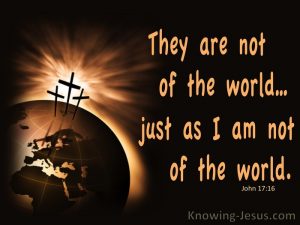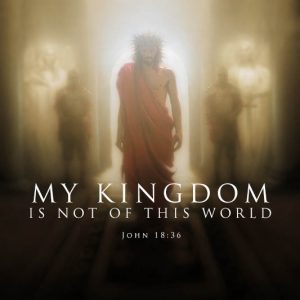
Shownotes
Welcome to Day 1581 of our Wisdom-Trek, and thank you for joining me.
I am Guthrie Chamberlain, Your Guide to Wisdom
Not of This World – Worldview Wednesday
Welcome to Wisdom-Trek with Gramps! Wisdom is the final frontier in gaining true knowledge. Our mission is to create a legacy of wisdom, seek out discernment and insights, and boldly grow where few have chosen to grow before. Hello, my friend; this is Gramps; thanks for coming along on our journey to increase Wisdom and Create a Living Legacy. Today is Day 1581 of our Trek, and it is Worldview Wednesday. Creating a Biblical Worldview is essential to have a proper perspective on today’s current events. To establish a Biblical Worldview, you must have a proper understanding of God and His Word. This week, we will continue reviewing the book from Dr. Michael S Heiser titled “Supernatural.” The book is an abbreviated version of his more comprehensive book, “The Unseen Realm.” I highly recommend both of these books. Creating a Biblical Worldview based on how the Old and New Testaments connect with God’s overall plan for humanity is essential. This book review will help us understand what the Bible teaches about the unseen world, and why it matters.
Not of This World
In Jesus’ well-known prayer in the garden of Gethsemane before he was arrested for trial, he said of his followers in John 17:16, They do not belong to this world any more than I do. Believers were certainly in the world, specially tasked by God to carry the gospel to every nation (Matthew 28:19–20), but they were not of the world. This paradox—being in the world but not of it—was telegraphed to early Christians in several memorable ways.
Sacred Space, Holy Ground, and God’s Presence
In chapter 8 of Supernatural, we talked about the concept of sacred space. For Old Testament Israelites, God was utterly other. The space his presence occupied was set apart from all other space. That wasn’t a denial that God was omnipresent—in all places at all times. Instead, it was a way of marking the territory on which he chose to meet with his people. That was one of the purposes for having the tabernacle and the temple. The concept of sacred space was not only the rationale for many of Israel’s laws and rituals, but it also reinforced the idea of cosmic geography—how the world was divided among the lesser gods and the Most High God, the God of Israel.
The notion of sacred space gets brought into the New Testament in a dramatic way. All we need to ask is, “Where is the presence of God right now?” While God is everywhere, he dwells explicitly within each believer. Believe it or not, you are sacred space. Paul very clearly wrote in 1 Corinthians 6:19 Don’t you realize that your body is the temple of the Holy Spirit, who lives in you and was given to you by God?
The same is true of the ground where believers gather as a group. Writing to the church at Corinth, Paul told them collectively in 1 Corinthians 3:16, Don’t you realize that all of you together are the temple of God and that the Spirit of God lives in you? He told the Ephesian believers they were “members of the household of God … a holy temple in the Lord. In him you also are built together into a dwelling place for God by the Spirit” (Eph. 2:19, 21–22).
The implications are startling. Most of us are familiar with Jesus’ statement in Matthew 18:20, “For where two or three gather together as my followers, I am there among them.” But viewed in the context of the Old Testament idea of sacred space, that statement means that wherever believers gather, the spiritual ground they occupy is sanctified amid the powers of darkness.
Yahweh’s final chosen dwelling place in the Old Testament was Israel—the temple in Jerusalem. Israel became holy ground because that’s where God’s presence resided. But that holy ground was threatened by the nations that surrounded it and their hostile gods. In the same way, believers today are in a spiritual war. We are now God’s temple, the special place God’s Spirit resides, points of the light of his presence—and we are scattered throughout a world in bondage to the powers of darkness.
Delivered unto Satan
This concept is illustrated well by Paul’s view on the sanctity of the local church. Every body of believers was holy ground, no place for unrepentant sin. In chapter 8 of Supernatural, we looked at how Israel’s camp dealt with sin to preserve its sanctity—its sacred space. We talked about the Day of Atonement (Leviticus 16), where the sins of the nation were ritually transferred to a goat—the one “for Azazel” (Leviticus 16:8, 10). Azazel was a demonic entity thought to inhabit the wilderness. The Israelites sent the goat out into the wilderness, carrying their sins away. The act symbolically sent the sins of the people where they belonged—into the wilderness, the place of spiritual darkness.

Paul has the Corinthians deal with sin the same way—sending it where it belongs. In 1 Corinthians 5:5, Paul wrote to the Corinthians about a man living in sexual immorality who needed to repent. He commanded, Then you must throw this man out and hand him over to Satan so that his sinful nature will be destroyed and he himself will be saved on the day the Lord returns. The rationale was clear—sin has no place on holy ground. Believers were to remove unrepentant believers from the church (1 Corinthians 5:9–13). To be expelled from the church was to be thrust into the realm of Satan, back out into the world.
Paul hoped the result for the unrepentant man would be his sinful nature will be destroyed and he himself will be saved on the day the Lord returns. (The reference here isn’t to physical death, but to the death of the fleshly lusts ensnaring this man [Galatians 5:24; 1 Corinthians 11:32–33]).
Baptism as Spiritual Warfare
Peter’s stand on this issue was the same as Paul’s—believers were pitted against the powers of darkness. His warfare thinking is found in one of the stranger passages in the New Testament, 1 Peter 3:14–22:
But even if you might suffer for the sake of righteousness, you are blessed. And do not be afraid of their intimidation or be disturbed, but set Christ apart as Lord in your hearts, always ready to make a defense to anyone who asks you for an accounting concerning the hope that is in you. But do so with courtesy and respect, having a good conscience, so that in the things in which you are slandered, the ones who malign your good conduct in Christ may be put to shame. For it is better to suffer for doing good, if God wills it, than for doing evil. For Christ also suffered once for sins, the just for the unjust, in order that he could bring you to God, being put to death in the flesh, but made alive in the spirit, in which also he went and proclaimed to the spirits in prison, who were formerly disobedient, when the patience of God waited in the days of Noah, while an ark was being constructed, in which a few—that is, eight souls—were rescued through water. And also, corresponding to this, baptism now saves you, not the removal of dirt from the flesh, but an appeal to God for a good conscience through the resurrection of Jesus Christ, who is at the right hand of God, having gone into heaven, with angels and authorities and powers having been subjected to him.
I’m sure you noticed the oddities in the passage. What do the ark, Noah, and imprisoned spirits have to do with baptism? And does this text say baptism saves us?
What Peter is doing here is similar to something Paul does in Romans 5. Paul talked about Jesus in that passage, but with Adam in mind as well. Think of Jesus as, in some ways, the opposite of Adam. That’s why Paul says things like “as by the one man’s disobedience [Adam’s] the many were made sinners, so by the one man’s obedience [Jesus’] the many will be made righteous” (Romans 5:19). Rather than Adam, Peter has Enoch in mind when he writes about Jesus in 1 Peter 3. But for Peter, Enoch and Jesus weren’t opposites. Enoch serves as an analogy for the point Peter wants to make about Jesus.
You might wonder, “What point?” After all, there are only a handful of verses about Enoch in the Old Testament (Genesis 5:18–24). All we learn there is that he lived before the great flood and that walking in close fellowship with God. Then one day he disappeared, because God took him. (Genesis 5:24). Those verses don’t really have any connection to what Peter says in 1 Peter 3 about Jesus.
To understand why something Enoch did reminded Peter of Jesus, we need to understand that Peter read about Enoch in Jewish books outside the Old Testament. Specifically, Peter was familiar with an ancient Jewish text that had a lot to say about Enoch. It was named, predictably, 1 Enoch. That book filled in lots of details about what happened at the time of the flood, especially the episode in Genesis 6:1–4, where the sons of God (Enoch calls them watchers) produced children (the Nephilim giants) with human women. When both Peter and Jude wrote about angels who sinned in the days of Noah (2 Peter 2:4–5; Jude 6), they were alluding to ideas in 1 Enoch that are not part of the biblical flood story. The Genesis flood account, for example, never tells us that the divine sons of God were imprisoned in the underworld realm of the dead until the end of days, but 1 Enoch does (1 Enoch 6:1–4; 7:1–6; 10:4, 11–13).
Something that happened to these “spirits in prison” in the book of 1 Enoch gave Peter insight into Jesus. In the 1 Enoch story, Enoch has a dream where the imprisoned spirits asked him to intercede with God on their behalf. After all, Enoch walked with God—who better to ask God to relent and release them? Enoch did so, but got bad news. God’s answer was an emphatic no. Enoch then had to deliver that answer—he descended to the spirits in prison. He told them they were still under judgment.
Peter used that story as an analogy for Jesus. The point he wanted to get across was that when Jesus died, he descended to the realm of the dead and had a message for the fallen divine beings there. When they saw Jesus enter the place of the dead, they were likely to think their fellow demons had won and they would be getting out of jail soon. Instead, Jesus told them they wouldn’t see him for long—he would rise again. It was all part of God’s plan. They hadn’t won—they were still under judgment and as doomed as ever. That’s why this odd passage ends the way it does in 1 Peter 3:22; Now Christ has gone to heaven. He is seated in the place of honor next to God, and all the angels and authorities and powers accept his authority.
Why does Peter connect all of this to baptism? In Peter’s mind, Jesus’ death and resurrection—complete with an announcement to the demonic powers of his victory—was symbolized in baptism. Baptism symbolizes the death, burial, and resurrection of Jesus (Romans 6:1–11).
For Peter, baptism “corresponds” to all this because it says in 1 Peter 3:21 And that water is a picture of baptism, which now saves you, not by removing dirt from your body, but as a response to God from a clean conscience. It is effective because of the resurrection of Jesus Christ. The Greek word for “appeal” refers to a pledge one takes. The Greek word for “conscience” often refers to an ability to tell right from wrong. But that isn’t the case here. Knowing the difference between right and wrong doesn’t have a specific relationship to the death, burial, and resurrection of Jesus. The Greek word can also point to making a commitment—and a good one, not a foolish one. That’s what Peter is getting at in 1 Peter 3. In essence, baptism was a loyalty oath and a message to the demonic powers (as well as any people present) of just whose side you were on in the spiritual war. Ancient Christians understood this better than we do today. Early church baptismal rites included a renunciation of Satan and his angels because of this passage.
Why This Matters

First, understand that believers are holy ground, the dwelling place of God’s presence—the glory of the Old Testament. Do we live like it? Israelites and the believers of Jesus’ day felt an ever-present need to be different from unbelievers. The goal wasn’t to be deliberately odd, so unbelievers would hope to avoid contact. Israel was to be a “kingdom of priests” and “a holy nation” (Exodus 19:6). Living the way God wanted his children to live led to fruitful, productive, happy lives. Israelites were to attract people enslaved by enemy gods back to the true God.
When our worldview is attuned to God’s plan to rescue people from every nation, making them part of God’s family, we are not of this world. Being of this world is to be absorbed by the world’s concerns and living accordingly. Unbelievers should be able to tell from our speech, behavior, ethics, and attitude toward others that we’re not cynical, selfish, or harsh—that our focus is not on getting ahead or on using people. We should not live to gratify ourselves. We are to be the antithesis of these things. In other words, we are to live as Jesus lived. People wanted to be around him because he wasn’t like most everyone else.
Second, what we do in our churches should elevate God and Jesus. In biblical times, a visit to the tabernacle or temple reinforced ideas about God’s perfection, otherness—and love for his children. Those things go hand-in-hand. Why would a God who needs nothing and is superior to everything want a human family? Why would that God bother creating a new family after casting aside the nations at Babel, consigning them to other gods? Why not just walk away? Because he loves us.
It’s because we know God could have done something else but didn’t that his love takes on meaning. When a church talks only about the love of God without pointing out the irony of that love when placed against God’s other character traits, believers will take that love for granted. It might sound cheap, for instance, to people unaware of God’s holiness.
A third implication of what we’ve discussed in this chapter is that the powers of darkness know whose side we are on by our behavior. They are not stupid. They see our loyalty to God, and they see us act on our decisions to follow Jesus through things like baptism and resistance to sin. But they also see us when we act disloyally to God, and they understand what vulnerability that introduces into our lives. Whether or not we believe it, we are being watched—by both sides of the spiritual war.
These truths are easier to understand than to live out. Though redeemed, we are fallen. To live these truths, we need our minds and hearts tuned to why we’re here, living as foreigners in our own world. Like Jesus, we are not of this world—in it, but not of it (John 8:23; 1 John 4:4). That contrast, and our status, will become even sharper once we get a handle on just what it means to be children of God.[1]
That will finish our study for this week’s worldview Wednesday. Join us again next week as we continue with the next chapter in Supernatural in our quest to build our Biblical Worldview. Tomorrow we will ponder another bit of wisdom from Gramps. So encourage your friends and family to join us and then come along with us tomorrow for another day of ‘Wisdom-Trek, Creating a Legacy.’

If you would like to listen to any of our past 1580 treks or read the Wisdom Journal, they are available at Wisdom-Trek.com. I encourage you to subscribe to Wisdom-Trek on your favorite podcast player so that each day’s trek will be downloaded automatically.
Thank you so much for allowing me to be your guide, mentor, and, most of all, your friend as I serve you through this Wisdom-Trek podcast and journal.
As we take this Trek together, let us always:
- Live Abundantly (Fully)
- Love Unconditionally
- Listen Intentionally
- Learn Continuously
- Lend to others Generously
- Lead with Integrity
- Leave a Living Legacy Each Day
I am Guthrie Chamberlain….reminding you to ’Keep Moving Forward,’ ‘Enjoy your Journey,’ and ‘Create a Great Day…Everyday’! See you Tomorrow!
[1] Heiser, M. S. (2015). Supernatural: What the Bible Teaches about the Unseen World—And Why It Matters. (D. Lambert, Ed.) (pp. 137–146). Bellingham, WA: Lexham Press.